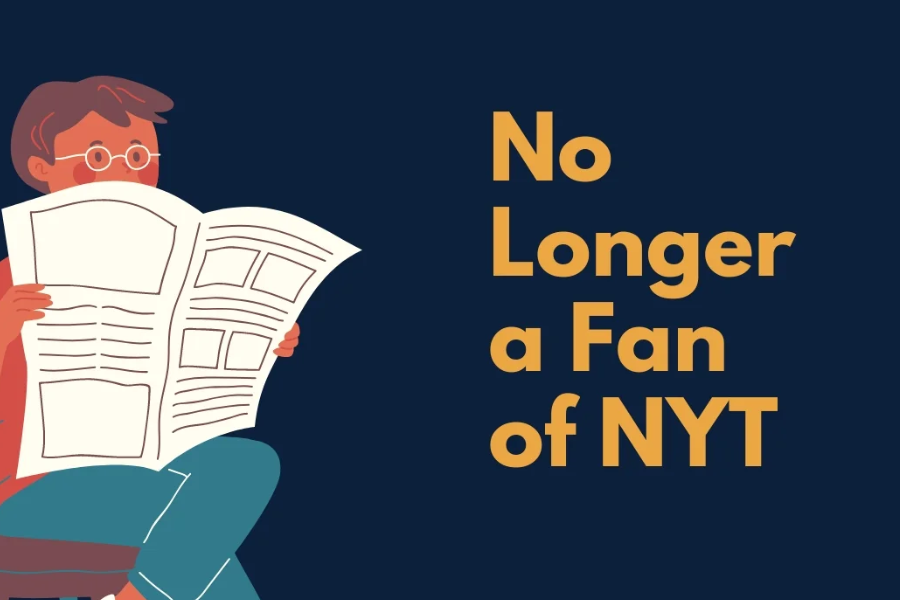No Longer A Fan of NYT Crosswords? Let’s Explore The Mystery Behind The Clue
For devoted solvers of The New York Times crosswords, there’s no shortage of twists and brain teasers. Yet a recent clue, “No longer a fan of NYT Crossword,” has especially puzzled and intrigued enthusiasts. Whether you’re a die-hard fan or new to the challenge, this phrase speaks to a unique experience that has divided opinions and sparked curiosity.
This cryptic clue hints at both the frustrations and the joys of tackling tough puzzles, perhaps even capturing the humorous frustrations some solvers feel when faced with the trickiest challenges. By diving into the interpretations and the emotions this clue evokes, we can see how crosswords continue to evolve, offering endless challenges that connect solvers through their shared love of clever, sometimes baffling wordplay.
Decoding The Essence Of “No Longer A Fan of NYT Crossword”

To understand the clue “No Longer a Fan of NYT Crossword,” solvers should look for connections beyond straightforward interpretations. Often, such clues are meant to inspire flexible thinking and require puzzlers to examine multiple layers of meaning. Rather than signaling a specific event or sentiment, it might suggest feelings like being “bored,” “jaded,” or “over it”—terms that capture a loss of excitement without rejecting crosswords altogether. This approach to clues makes crosswords a unique mental exercise, where clues can be enjoyed for their cleverness and wordsmithing, even as they test patience.
By embracing the clue’s challenge, players experience the hallmark of a well-crafted crossword: engaging solvers in a mental dialogue, urging them to balance creativity with logic. Tackling clues like “No Longer a Fan of NYT Crossword” reminds enthusiasts of the thrill in every puzzle—a journey of playful discovery and problem-solving.
Hints For Solving “No Longer A Fan of NYT Crossword Puzzle”
When faced with the clue “No Longer a Fan of NYT Crossword Puzzle,” solvers are encouraged to explore word associations that might capture the essence of disinterest or fatigue. Common crossword techniques like synonym searching, word association, and lateral thinking can guide you to the answer. Words like “bored,” “jaded,” or even “indifferent” could all be valid interpretations, as they reflect the clue’s tone while maintaining its subtlety.
This clue is a perfect example of how NYT crosswords keep solvers on their toes, requiring them to dig deep into both vocabulary and context. By expanding their thinking, solvers can find the right answer and experience the satisfaction that only a complex puzzle can provide. The best approach to puzzles like this is to stay open-minded and embrace the challenge as part of the rewarding process that makes crosswords so captivating.
The Impact Of Digital Transformation: Why Some Are No Longer Fans Of NYT
Digital transformation has dramatically reshaped media, and The New York Times has navigated this shift with significant changes to its structure and priorities. The drive toward digital subscriptions and the emphasis on online engagement metrics have affected not only how stories are shared but also what stories are chosen for coverage. In this new landscape, many news outlets, including the NYT, have had to adapt to maintain readership and revenue in a digital-first world. However, this evolution has introduced concerns for longtime readers, some of whom feel that digital priorities might sometimes prioritize attention-grabbing content over more nuanced reporting.
As articles are increasingly crafted to generate clicks and high engagement, critics argue that the depth and quality of reporting may suffer. This shift could result in more surface-level stories designed to appeal quickly to readers scrolling through a screen, leaving less space for comprehensive, in-depth analysis. For some, these changes signal a departure from the high standards they once associated with the NYT. Thus, it is no surprise that discussions around being “no longer a fan of NYT” have emerged, reflecting the mixed reactions among readers to the digital transformation shaping modern journalism.
Strategies For Solving the “No Longer A Fan of NYT” Crossword Clue

When tackling the “No Longer a Fan of NYT” crossword clue, a strategic approach can make all the difference. Start by thinking beyond the literal meaning, as clues like this often rely on wordplay or subtle associations that lead you to the answer. Consider various angles and meanings, and remember that the solution may not directly relate to the clue’s wording but could involve clever twists or double meanings.
A helpful trick is to look at related clues within the same crossword puzzle, as they may offer contextual hints. Crosswords often feature themes, patterns, or recurring ideas that can provide insights into challenging clues like this one. If you’re still stumped, engaging with online resources or crossword communities can be invaluable. Fellow enthusiasts frequently share their unique perspectives, which can be a game-changer for tackling tough puzzles like “No Longer a Fan of NYT.”
Exploring Alternative Crossword Puzzles And Platforms
If you’re seeking to expand your crossword experience beyond the New York Times, many other platforms provide unique and engaging puzzles. Crossword outlets like The Guardian, Wall Street Journal, and LA Times offer a range of puzzles catering to various skill levels and styles, which can add variety to your solving routine and introduce fresh perspectives.
For more niche or themed puzzles, platforms like PuzzleNation and Crossword Nexus feature content created by independent constructors. These sites showcase a wide variety of wordplay styles, including themed puzzles and clever grids that bring an extra layer of creativity. By exploring new sources, you’ll find fresh clues and themes to challenge yourself, discovering hidden gems in the world of crosswords beyond the NYT.
Reactions From NYT Crossword Enthusiasts Regarding The “No Longer A Fan of NYT” Clue

The “No Longer a Fan of NYT” clue has stirred some frustration among NYT Crossword fans, sparking online discussions and feedback from solvers. Many enthusiasts found this particular clue both challenging and ambiguous, feeling it strayed from the typical NYT standard of clear, accessible hints. Some argue that its cryptic nature detracts from the puzzle’s usual enjoyment, as the clue seems unnecessarily obscure or difficult to interpret.
This feedback underscores the importance of transparency and consistency in crossword clues to ensure that puzzles remain engaging for all players. For many, the satisfaction of solving a puzzle comes from a fair challenge rather than overly ambiguous clues. Although fans continue to appreciate the NYT Crossword, clues like these highlight the balancing act between clever wordplay and accessible difficulty, crucial for maintaining a positive experience among solvers.
The Challenge Of The “No Longer A Fan of NYT Crossword” Clue
For avid crossword solvers, encountering the clue “No Longer a Fan of NYT Crossword” may be both intriguing and frustrating. This clue, like many in the NYT’s iconic puzzle series, invites puzzlers to think outside the box and wrestle with both direct and indirect meanings. At first glance, it might suggest someone who has lost enthusiasm for The New York Times crossword itself, but true enthusiasts know better than to take such clues literally. This phrase encapsulates the unique thrill of the crossword: its demand for wit, wordplay, and an interpretive approach.
To tackle this clue, solvers need to move beyond the obvious, considering that it may signify a shift in interest or a sense of boredom rather than simply “disliking” the crossword. This clue’s complexity illustrates why NYT crosswords are beloved: they encourage players to stretch their vocabulary, think abstractly, and enjoy the satisfaction that comes with unraveling cryptic meanings.
Moving Forward: The Future Of Media And Its Challenges

As traditional media grapples with a rapidly changing landscape, media literacy has emerged as a vital skill for today’s news consumers. With the rise of sensationalism and the blending of credible news with misinformation, readers need the tools to evaluate sources, identify bias, and distinguish between reliable journalism and sensationalized content. By fostering media literacy, audiences can navigate this complex media environment with greater confidence, allowing them to make informed choices about what they read, share, and believe.
Accountability as a Cornerstone of Journalism
To rebuild and maintain public trust, accountability should be at the heart of journalistic practice. Media organizations like The New York Times must prioritize transparency, including clear corrections of errors, open disclosure of any potential biases, and strict adherence to rigorous reporting standards. Addressing these elements can help rebuild their reputation as reliable sources, demonstrating a commitment to high-quality journalism that values truth and accountability over clicks or sensationalism.
Adapting Through Innovation
The future of journalism will likely be shaped by the merging of traditional reporting values with innovative approaches that cater to evolving reader expectations. To remain relevant, media outlets must embrace technological advancements, experiment with storytelling formats, and deepen interactive engagement. For an organization like The New York Times, success will depend on adapting to these changes while maintaining core values like accuracy and integrity, creating a media experience that resonates with modern audiences without sacrificing trust.
FAQs
1. Why are some crossword fans “No Longer a Fan of NYT Crossword”?
Some solvers feel frustrated with vague or overly complex clues, which they believe detract from the puzzle’s usual enjoyment.
2. What does “No Longer a Fan of NYT Crossword” hint at?
This cryptic clue may suggest feelings like “bored” or “jaded,” prompting solvers to think beyond literal interpretations.
3. How has digital transformation impacted the NYT?
The shift toward digital has led to more click-driven content, which some feel may reduce the depth and quality of reporting.
4. Where can I find alternatives to NYT Crossword?
The Guardian, Wall Street Journal, LA Times, and platforms like PuzzleNation offer engaging and varied crossword options.
Conclusion
The journey through the “No Longer a Fan of NYT” crossword clue sheds light on both the joys and frustrations inherent in puzzle-solving. While cryptic clues keep solvers thinking outside the box, they can also test patience, highlighting the fine line between cleverness and accessibility. Meanwhile, the media’s shift to digital has introduced both innovation and challenges in how content, including crosswords, is created and consumed. As readers and solvers navigate these changes, media literacy and a commitment to transparency will be essential for maintaining trust and engagement in an evolving landscape. For those who cherish the art of the puzzle, exploring alternative platforms can refresh their love for crosswords, showcasing the broader world of clever wordplay and mental exercise.
Stay in touch for more updates and alerts visit: Feedback Magazinne





